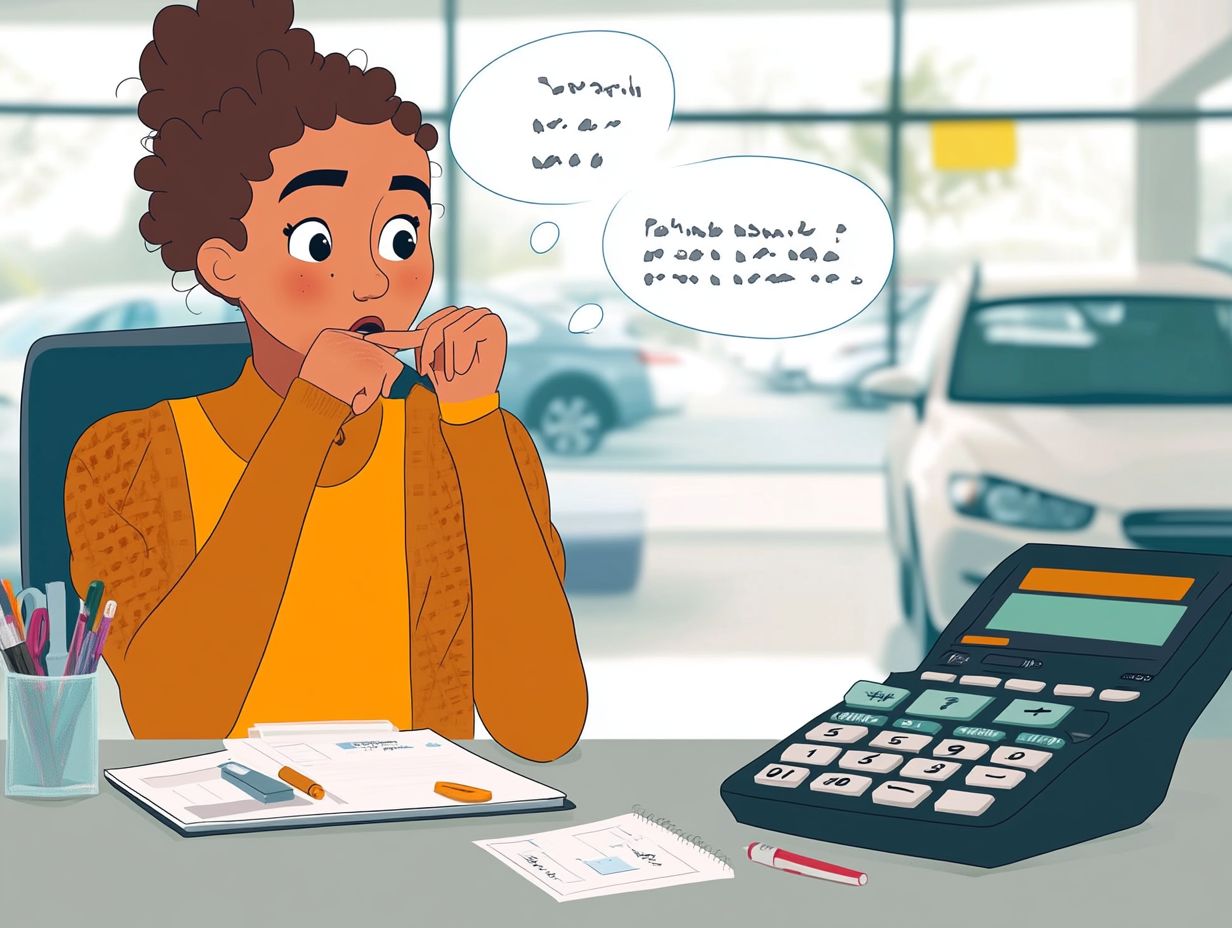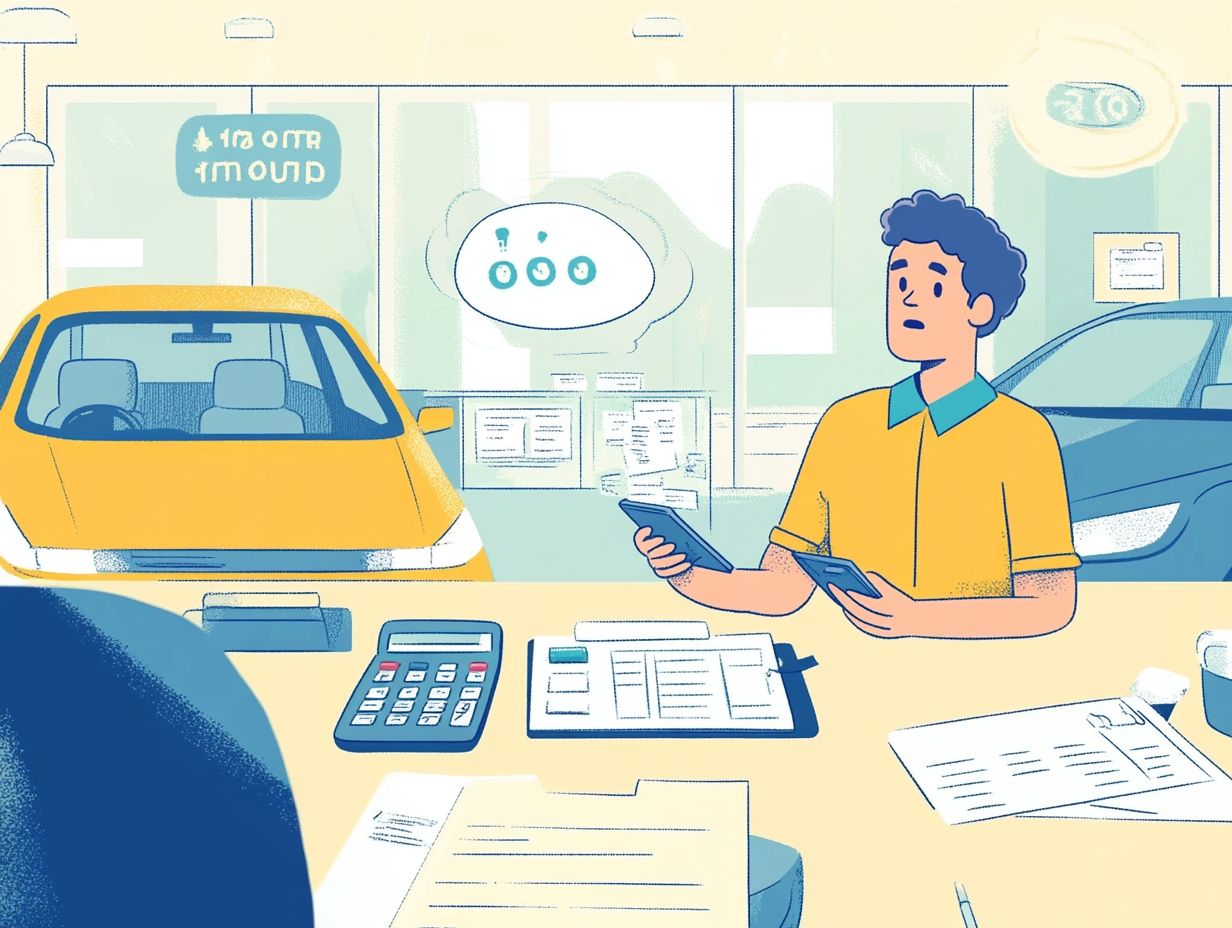5 Common Mistakes in Car Price Negotiation
Negotiating the price of a car can feel overwhelming, especially for first-time buyers. It s easy to stumble into common pitfalls that could end up costing you dearly.
This article explores five key mistakes to avoid during your car price negotiations, from insufficient research to fixating solely on monthly payments.
It also emphasizes the importance of understanding the total cost of ownership and how engaging with multiple dealerships can give you a significant advantage.
Equip yourself with insights and strategies to secure the best deal possible!
Contents
- Key Takeaways:
- 1. Not Doing Enough Research
- 2. Focusing Only on the Monthly Payment
- 3. Not Considering the Total Cost of Ownership
- 4. Not Negotiating with Multiple Dealerships
- 5. Not Being Willing to Walk Away
- What Are the Key Factors to Consider Before Negotiating a Car Price?
- How Can Research Help in Negotiating a Car Price?
- Frequently Asked Questions
- What are some common mistakes people make when negotiating car prices?
- C mo afecta no hacer suficiente investigaci n a la negociaci n de precios de autom viles?
- Por qu es importante considerar el margen de ganancia del concesionario al negociar precios de autom viles?
- C mo puede negociar con m ltiples concesionarios ayudar a obtener un mejor trato?
- Por qu es importante tener un presupuesto antes de negociar precios de autom viles?
- S ! Est bien alejarse de una negociaci n?
Key Takeaways:

Do your research before negotiating to avoid dealership tricks.
Understand the total cost of ownership to make smarter financial decisions.
Explore multiple dealerships to find the best deal.
1. Not Doing Enough Research
Skipping thorough research is one of the biggest blunders you can make when buying a car. It can lead to hasty, uninformed choices that affect your vehicle needs, financing options, and the overall deal you receive. To avoid this, consider these 7 tips for effective car negotiation.
Being well-informed about key automotive resources, like Edmunds and Kelley Blue Book, is crucial for navigating today s auto market. These sites provide valuable insights into vehicle history, safety ratings, and fair trade-in values.
Using these resources empowers you with the relevant information you need. This boosts your confidence during negotiations, transforming your buying experience and helping you advocate for your best interests.
2. Focusing Only on the Monthly Payment
Focusing solely on the monthly payment might seem appealing, but it often obscures the total cost of ownership and other essential factors that impact your car buying experience.
This narrow perspective can lead you to overlook crucial elements like higher interest rates, where lenders lure you in with lower monthly payments by extending the loan term. This can significantly inflate the overall cost.
You may also forget to factor in maintenance expenses and insurance, which can accumulate over time, turning what seemed to be an affordable choice into a financial burden.
By considering these additional factors and the long-term implications of vehicle ownership, you can make more informed decisions. This ultimately leads to greater satisfaction and financial stability in the years to come.
3. Not Considering the Total Cost of Ownership
Neglecting the total cost of ownership is a common pitfall in car buying that can greatly affect your financial well-being and overall satisfaction with your vehicle choice. Understanding the factors that influence car price negotiation can help you make a more informed decision.
You might find yourself focused solely on the purchase price, overlooking other essential expenses that accumulate over time. One often underestimated cost is insurance, which can vary dramatically depending on the vehicle model and your driving history.
Fuel efficiency also plays a crucial role in your ongoing monthly expenses; vehicles with lower fuel efficiency can quickly become a financial burden. Maintenance is another key factor, as some cars require more frequent services or costly repairs, increasing your long-term expenses.
Depreciation impacts both new and used cars, influencing resale value and overall investment. By considering these elements, you can make more informed decisions that align with your budget and lifestyle.
4. Not Negotiating with Multiple Dealerships

Failing to negotiate with multiple dealerships is a critical mistake in the car buying process. To avoid this and other potential pitfalls, it’s important to understand the most common car buying mistakes. This oversight can lead to bad deals and missed opportunities for better pricing and financing options.
Exploring various dealerships gives you insights into the market. This competitive approach reveals potential discounts and allows you to leverage different prices and financing offers during negotiations.
When a dealership presents a strong offer, use it as leverage. It can compel other dealers to match or beat that price.
Understanding dealership financing options helps you secure favorable terms. This knowledge elevates your buying experience and ensures you maximize your investment.
5. Not Being Willing to Walk Away
Being unwilling to walk away can trap you in bad car deals. To avoid this, familiarize yourself with negotiating car prices: do’s and don’ts. Establish your limits and stick to them for a successful car-buying experience.
Clear boundaries boost your confidence in negotiations. When you show readiness to walk away, it influences the dealer s tactics.
Communicating your budget openly creates leverage. It encourages dealers to offer better trade-in values and financing options.
Picture this: when you confidently walk away, the dealership might call you back with better terms to keep you interested.
What Are the Key Factors to Consider Before Negotiating a Car Price?
Before negotiating, do your homework. Key factors include the vehicle’s history, safety features, and financing negotiation tips.
Checking the vehicle’s history reveals past accidents or maintenance issues. Use resources like Carfax for accurate reports.
Consumer reports provide safety ratings and insights into similar models. This information helps you showcase the vehicle s true value during negotiations.
With this data, you can approach pricing discussions confidently, leading to better deals and fair value for your investment.
How Can Research Help in Negotiating a Car Price?
Thorough research elevates your position in car negotiations. Use data from sources like Edmunds and Kelley Blue Book to leverage vehicle history and pricing.
By exploring multiple platforms, you can compare features and evaluate market trends. Understanding these aspects helps establish a fair price range.
Awareness of seasonal pricing fluctuations or special incentives can be a game-changer. This knowledge allows you to time your purchases strategically.
Ultimately, being well-informed transforms the car-buying experience into a powerful decision-making process. You increase your chances of securing a fantastic deal.
What Are the Hidden Costs of a Car Purchase?

Understanding the hidden costs associated with a car purchase is essential for you as a buyer. These expenses can significantly impact the overall cost of ownership and your monthly payments over time.
When considering a vehicle acquisition, it s easy to get caught up in the allure of the sticker price and financing terms. This often leads to overlooking critical elements like taxes, registration fees, insurance premiums, and routine maintenance expenses.
These factors can pile up quickly, transforming what seemed like an enticing deal into a burden. As you navigate your budget, it s vital to conduct thorough research into these additional costs.
By anticipating these hidden fees, you can create a more accurate budget that truly reflects the financial commitment of owning a car. This strategy empowers you to make smart choices!
How Can Negotiating with Multiple Dealerships Benefit You?
Negotiating with multiple dealerships not only gives you a broader perspective on pricing but also gives you the power to secure better financing options and more favorable out-the-door prices.
This competitive environment among dealerships pushes them to offer more attractive deals to distinguish themselves in a crowded market. For example, when one dealership discovers that you have a competing offer, they might feel compelled to enhance their proposal with improved financing terms or cash discounts.
You can take full advantage of this competition by openly sharing these offers during negotiations. This approach elevates the stakes and significantly increases your chances of landing a deal that aligns with your financial needs while ensuring you feel satisfied with your purchase.
Why Is It Important to Be Willing to Walk Away in Negotiations?
Being prepared to walk away from negotiations is a powerful strategy that can truly transform the dynamics in your favor. It enables you to secure a better deal on a car while significantly reducing any potential buyer’s remorse.
This tactic shows confidence and encourages the other party to reconsider their stance. Imagine you, the savvy buyer, have thoroughly researched market values and set a solid budget before stepping into the negotiation arena.
When faced with a stubborn salesperson, your willingness to walk away can prompt them to rethink their terms, possibly resulting in more favorable offers. Firmly rejecting an initial proposal can compel the dealer to counter with a more enticing deal.
These situations highlight the financial advantages and the psychological edge that comes from maintaining a position of strength, illustrating that you are in control of your choices.
What Are Some Common Tactics Used by Dealerships in Negotiations?
Understanding the common tactics dealerships use during negotiations is essential for you as a buyer. This knowledge can help you navigate the car buying process with finesse and steer clear of pitfalls, including those highlighted in 5 common mistakes in reading car reviews.
Being aware of strategies such as upselling where dealerships may urge you to consider additional features and services that can drive up the total cost is vital. They might also manipulate financing options to create an illusion of lower monthly payments while extending loan terms. This can really change how much you spend overall.
With this insight, you can confidently ask direct questions about fees, explore multiple financing options, and maintain a firm stance on your budget limits. Additionally, avoiding common pitfalls will help; be sure to check out the 5 mistakes to avoid when writing car reviews. Having a well-researched plan and being ready to walk away from an unfavorable deal further fortifies your position, ensuring a more satisfactory car purchasing experience.
Frequently Asked Questions

What are some common mistakes people make when negotiating car prices?
Common mistakes in negotiating car prices include not researching enough about the car’s value, not considering the dealer’s profit margins, not negotiating with multiple dealerships, not being prepared with a budget, and not being willing to walk away from a bad deal. To better navigate the process, it’s important to debunk some myths; check out 5 common myths about new car buying for helpful insights.
C mo afecta no hacer suficiente investigaci n a la negociaci n de precios de autom viles?
No te arriesgues a pagar de m s; investiga el valor del autom vil antes de negociar! No hacer suficiente investigaci n puede llevar a pagar m s de lo necesario. Esto incluye no conocer el valor de mercado del autom vil y no considerar su depreciaci n.
Por qu es importante considerar el margen de ganancia del concesionario al negociar precios de autom viles?
Los concesionarios necesitan obtener un margen de ganancia en cada venta. Si un comprador no es consciente de esto, puede terminar negociando un precio demasiado bajo, lo que puede hacer que la negociaci n falle.
C mo puede negociar con m ltiples concesionarios ayudar a obtener un mejor trato?
Negociar con varios concesionarios ayuda a los compradores a entender mejor el valor de mercado del autom vil que desean. Tambi n les brinda la oportunidad de comparar ofertas y negociar un precio m s bajo.
Por qu es importante tener un presupuesto antes de negociar precios de autom viles?
Un presupuesto ayuda a los compradores a mantenerse dentro de sus l mites financieros. Tambi n les da un punto de partida para las negociaciones y les permite encontrar el mejor trato dentro de su presupuesto.
S ! Est bien alejarse de una negociaci n?
S ! A veces, alejarse es la mejor estrategia si los t rminos y el precio no son satisfactorios. Alejarse puede mostrar al concesionario que est s decidido a obtener un buen trato y puede hacer que est n m s dispuestos a negociar.
Empieza tu investigaci n ahora y convi rtete en un experto negociador!






